Refugees
Syrian forces leave Sweida under ceasefire with Druze militias
DAMASCUS, Syria (AP) — Syrian forces largely withdrew from the southern province of Sweida on Thursday following days of clashes with militias linked to the Druze minority.
While the truce between Druze armed groups and government forces appeared to be largely holding, state media reported that Druze militants had launched revenge attacks on communities of Sunni Bedouins, leading to a wave of displacement.
Bedouin clans had fought alongside government forces against the Druze groups.
Druze leaders and Syrian government officials reached a ceasefire deal mediated by the United States, Turkey and Arab countries.
Under the ceasefire agreement reached Wednesday, Druze factions and clerics have been appointed to maintain internal security in Sweida, Syria’s interim President Ahmad al-Sharaa said in an address broadcast early Thursday.
A tank for the Syrian government forces carried on a truck, which withdraw from Sweida city, pass on Daraa highway, southern Syria, Tuesday, July 15, 2025. (AP Photo/Omar Sanadiki)
The fighting had threatened to unravel Syria’s postwar political transition and brought further military intervention by neighboring Israel, which on Wednesday struck the Syrian Defense Ministry headquarters, in central Damascus. Israel said it was acting to protect the Druze religious minority.
People pass in front the Syrian Defense Ministry building which on Wednesday was heavily damaged by Israeli airstrikes in Damascus, Syria, Thursday, July 17, 2025. (AP Photo/Ghaith Alsayed)
Israeli Prime Minister Benjamin Netanyahu vowed Thursday to keep southern Syria demilitarized and to protect the Druze community, which has a sizeable population in Israel.
“This will also be the continuation of our policy,” said Netanyahu, who said the ceasefire was reached because of Israel’s intense strikes on government forces during the clashes. “We will not allow military forces to descend south of Damascus, we will not allow the Druze to be harmed in Jebel Druze.”
Convoys of government forces started withdrawing overnight as Syrian state media said the withdrawal was in line with the ceasefire agreement and the military operation against the Druze factions had ended.
It remained unclear if the ceasefire would hold after the agreement was announced by Syria’s Interior Ministry and in a video message by a Druze religious leader. A previous agreement Tuesday quickly broke down after being dismissed by prominent Druze cleric Sheikh Hikmat Al-Hijri.
Looting homes and killing civilians
A Turkish official said Thursday that Foreign Minister Hakan Fidan and intelligence chief İbrahim Kalin held a series of diplomatic and security contacts to de-escalate the clashes. They worked with the U.S. special envoy for Syria, Israel, and regional officials and leaders, including Lebanese Druze leader Walid Jumblatt, said the official who requested anonymity to discuss the issue.
The escalation in Syria began with tit-for-tat kidnappings and attacks between local Sunni Bedouin tribes and Druze armed factions in the southern province of Sweida. Government forces that intervened to restore order clashed with the Druze militias, but also in some cases attacked civilians.
Video circulated on social media showed government forces and allies humiliating Druze clerics and residents, looting homes and killing civilians hiding inside their houses. Syrian Druze from Sweida told The Associated Press that several family members who were unarmed had been attacked or killed.
Syrian Druze people cross back into Syria as they walk at the Israeli-Syrian border, in the Israeli-controlled Golan Heights town of Majdal Shams, Thursday, July 17, 2025. (AP Photo/Leo Correa)
“We are committed to holding accountable those who wronged our Druze brethren,” Al-Sharaa said, describing the Druze as an ”integral part of this nation’s fabric” who are under the protection of state law and justice.
‘Militant sectarianism’
The Druze community had been divided over how to approach al-Sharaa’s de facto Islamist rule over Syria after largely celebrating the downfall of Bashar Assad and his family’s decades-long dictatorial rule. They feared persecution after several attacks from the Islamic State militant group and al-Qaeda-affiliates the Nusra Front during Syria’s 14-year civil war.
Issam al-Reis, a senior military adviser with Etana, a Syrian research group, said the lack of “effective state-led negotiations” could sow further divisions between the Druze community with the Sunni Beduins who largely were able to coexist.
“This is leading to militant sectarianism which is dangerous,” he said, adding it’s a sign that the government needs to speed up its integration of other sects into the Syrian army, that could make it a more unifying force and could help resolve sectarian tensions.
“There have been agreements and talks about this with different communities, but until now none of this has been implemented,” he said.
The Druze religious sect began as a 10th-century offshoot of Ismailism, a branch of Shiite Islam. More than half of the roughly 1 million Druze worldwide live in Syria. Most of the other Druze live in Lebanon and Israel, including in the Golan Heights, which Israel captured from Syria in the 1967 Mideast War and annexed in 1981.
Druze from Syria hug relatives from Israeli Druze community before crossing the Israeli-Syrian border, in the town of Majdal Shams, in the Israeli-controlled Golan Heights, Thursday, July 17, 2025. (AP Photo/Leo Correa)
—
Associated Press writer Suzan Fraser from Ankara, Turkey contributed to this report.
Refugees
Architect pushes to restore a quake-damaged church in Antakya, Turkey
ANTAKYA, Turkey (AP) — Architect Buse Ceren Gul is on a mission: restore a 166-year-old Greek Orthodox church that was long a beacon of her hometown’s multicultural past. She believes restoring the church left mostly in ruins by the earthquakes in southern Turkey three years ago will help locals reconnect to their city.
The magnitude 7.8 earthquake on Feb. 6, 2023, and another hours later were among Turkey’s worst disasters. In Antakya, the quakes destroyed much of the historical town center.
After years of planning, campaigning and fundraising, Gul’s team recently uncovered St. Paul’s Church from the rubble that reached up to 5 meters (16 feet).
“The old city is central to the earliest memories of anyone who grew up here,” the 34-year-old Gul told The Associated Press, strolling around the church.
“‘Have we vanished?’ I asked myself when I first saw the site in the aftermath of the quakes,” she said.
The quakes destroyed or damaged hundreds of thousands of buildings in Turkey, leaving more than 53,000 people dead. Another 6,000 people were killed in neighboring Syria.
An estimated 10,000 Christians lived in Hatay province before the earthquake, a tiny part of the overall population but one of the largest Christian concentrations in Turkey outside Istanbul.
Antakya was one of the hardest-hit cities, with the destruction threatening to erase one of its oldest streets, Saray Avenue, a hub for Christians, Muslims and Jews of different sects. The street is home to the Greek Orthodox St. Paul’s Church, which belongs to an Arabic-speaking community.
The neighborhood, like others in Antakya, has become “unrecognizable to its residents,” said Gul, who belongs to the Alevi Muslim community. “But raising the old city on its feet might prove that Antakya’s roots can be preserved once again.”
Saving its rich history
Gul was studying and working on the St. Paul’s Church’s renovation since before the earthquakes. Of the 293 cultural heritage sites damaged in the province, the church is among the few that already had approved architectural drawings, which Gul was drafting.
“When I was working on those plans, one of my mentors told me to draw in a way that the church can get rebuilt if it gets demolished,” Gul said. “I never thought this grand structure could actually be obliterated, but I drafted a point-by-point plan.”
Known as Antioch in the Middle Ages, Antakya is a biblical city dating to the sixth century B.C.E. Over centuries, its Hellenistic, Roman and Ottoman layers — and its diverse ethnic, religious and linguistic communities — survived at least five earthquakes of magnitude 7.0 or higher since 115 C.E., disasters that killed hundreds of thousands of people and leveled much of the city.
St. Paul’s Church, a part of Greek Orthodox Patriarchate of Antioch, on the eastern bank of the Orontes River, was completely rebuilt in 1900 after being destroyed by an earthquake in 1872.
After saving the rebuilding plans from the ruins of her office right after the quakes, Gul secured the support of the World Monuments Fund, a nonprofit that works to preserve endangered cultural heritage.
With the fund’s technical and financial contributions, Gul’s team cleared tons of rubble and set aside the stones they recovered intact. The team continues project planning and technical assessments for the reconstruction stage, but the work on site has stalled until more funding arrives.
“We used to be a financially self-sufficient foundation that was able to help families in need,” Fadi Hurigil, president of the Greek Orthodox Church Foundation of Antakya, which oversees the reconstruction project, told AP. “We lost up to 95% of our income after the earthquakes.”
The rents from church-owned shops on Saray Avenue that catered to tourists provided the church with its main income. Their reopening will be key to help the congregation start generating income as post-earthquake monetary aid from the Greek Orthodox Patriarchate in Damascus and other donors has dwindled, Hurigil said.
Since the beginning of the year, the Ministry of Environment, Urbanization and Climate Change has contracted a company for the redevelopment of the shops.
Challenges of rebuilding after the earthquake
The main challenge for the Antioch Orthodox Christians is the return of people who once filled the St. Paul’s Church’s courtyard and the Saray Avenue district. With most houses in the historical city center still in ruins, the majority of the city’s Greek Orthodox community are displaced from their ancestral homes.
Hurigil said 370 to 400 families lived in central Antakya before the quakes, of whom only about 90 have returned, though others visit the city for commemorative ceremonies.
“The community’s biggest need to be able to return to Antakya is the reconstruction of their homes and commercial properties,” he said.
Many in the Christian Orthodox Community with damaged or destroyed properties live outside of Antakya in smaller districts of Hatay province or in surrounding cities, in the absence of a wider urban planning for restoration of Antakya’s historical center.
Evlin Hüseyinoğlu is one of them. She had a family home only a few minutes walk from Saray Avenue that was rebuilt just before the earthquakes.
It had only minor damages in the quake, but the family found it financially risky to restore and settle back in the house in the absence of a decisive urban plan. They are living in Arsuz, a three-hour drive from Antakya, in what used to be their summer house.
Residents and community leaders who lived in the city for generations fear that the extended displacement of different religious and ethnic groups from the city will upend the long-established intercultural harmony that characterized Antakya.
“We grew up in Saray Avenue, now there is no Saray Avenue,” says Dimitri Dogum, 59, a St. Paul’s Church official whose family lived in Antakya for the past 400 years. “So many people have left the city already and it could take another five years until Antakya recovers.”
Dogum, who is Christian, fears that his son and the children of his Sunni Muslim friends will not form the sort of friendships and interfaith dialogue he enjoyed when he spent long days of his boyhood playing on the street together.
“People are gone now,” said Dogum. “My fear is that we will lose the culture of living together.”
___
Associated Press religion coverage receives support through the AP’s collaboration with The Conversation US, with funding from Lilly Endowment Inc. The AP is solely responsible for this content.
Refugees
Turkey hopes to gather US and Iran for negotiations this week
DUBAI, United Arab Emirates (AP) — Turkey is attempting to bring both the U.S. and Iranian officials to the negotiating table, possibly by the end of the week, in hopes of easing the threat of U.S. military action against Iran.
Neither the U.S. nor Iran has confirmed whether they plan to take part in any negotiations. Two Turkish officials, who spoke on the condition of anonymity because they were not authorized to speak to the media, said Turkey is trying to organize a meeting between U.S. special envoy Steve Witkoff and Iranian leaders. The meeting could take place as soon as the end of the week, one of the officials said.
The military has moved the USS Abraham Lincoln and several guided-missile destroyers into the Middle East, but it remains unclear whether U.S. President Donald Trump will decide to use force against the Iranian government, as he has suggested he might do in retribution for their devastating crackdown on last month’s protests.
“Trump is trying to calibrate a response to Iran’s mass killing of protesters that punishes Iranian leaders without also embroiling the United States in a new, open-ended conflict in the region,” the New York-based Soufan Center think tank said Monday.
An Arab diplomat who spoke on condition of anonymity because the meeting has not been confirmed said there had been discussions about Turkey hosting a high-level meeting to bring Arab and Muslim countries together with the United States and Iran.
Turkey’s role
Trump also has sought to pressure Iran to make a deal that would constrain its nuclear program. Iranian Foreign Minister Abbas Araghchi and Witkoff met multiple times last year in negotiations over Iran’s nuclear program in Rome and Oman, but never finalized a deal. On June 13, Israel launched attacks on Iran that sparked a 12-day war between the countries, effectively halting those talks. The U.S. bombed three Iranian nuclear sites during the war.
Baghaei of the Iranian Foreign Ministry declined to give any specifics about the possibility of talks in Ankara. The U.S. didn’t immediately comment on the possible talks.
Witkoff is expected to meet Prime Minister Benjamin Netanyahu and other Israeli security officials on Tuesday, according to a White House official who was not authorized to comment publicly about the talks and spoke on condition of anonymity. He will travel to Abu Dhabi later in the week for Russia-Ukraine talks, the official said.
EU sanctions
Also on Monday, Iran said it had summoned all European Union ambassadors in the country to protest the bloc’s listing of the paramilitary Revolutionary Guard as a terror group.
The 27-nation bloc agreed to list the Guard as a terror group last week over its part in the crackdown on nationwide protests in January that killed thousands of people and saw tens of thousands of others detained.
Other countries, including the U.S. and Canada, have previously designated the Guard as a terrorist organization. While the move is largely symbolic, it adds to the economic pressure squeezing Iran.
Iranian Foreign Ministry spokesman Esmail Baghaei told journalists that the ambassadors had begun to be summoned on Sunday and that process went into Monday.
“We think that in coming days, a decision will be made about a reciprocal action,” Baghaei said.
Iran’s parliamentary speaker said Sunday that the Islamic Republic now considers all EU militaries to be terrorist groups, citing a 2019 law. The European Commission, the bloc’s executive branch, said it was keeping diplomatic channels open with Tehran, despite the tensions, and urged restraint from military action.
The Guard emerged from Iran’s 1979 Islamic Revolution as a force meant to protect the Shiite cleric-overseen government and was later enshrined in its constitution. It operates in parallel with the regular armed forces and has expanded into private enterprise, allowing it to thrive.
The Guard’s Basij force likely was key in putting down the demonstrations, starting in earnest from Jan. 8, when authorities cut off the internet and international telephone calls for the nation of 85 million people. Videos that have come out of Iran via Starlink satellite dishes and other means show men likely belonging to its forces shooting and beating protesters.
On Monday, the U.K. government joined a number of countries that sanctioned Iran’s interior minister, who oversees the country’s police, and nine other Iranians for their alleged role in facilitating the crackdown. They were subjected to immediate asset freezes and travel bans.
Strait of Hormuz drill
Baghaei also said an exercise by the Guard in the Strait of Hormuz, the narrow mouth of the Persian Gulf through which a fifth of all of the global oil trade passes, was “ongoing based on its timetable.”
Iran warned ships last week that a drill would be carried out on Sunday and Monday, but prior to Baghaei’s comments hadn’t acknowledged it taking place. The U.S. military’s Central Command issued a strong warning to Iran not to harass its warships and aircraft or impede commercial vessels moving through the strait.
Satellite photos taken Sunday by Planet Labs PBC and analyzed by The Associated Press showed small vessels moving at speed in the strait between Iran’s Qeshm and Hengam islands, some distance away from the corridor commercial vessels take. The Guard relies on a fleet of small, fast-attack ships in the strait.
Asked whether Iran could face a war, Baghaei told the public “don’t worry at all.” He declined to discuss whether Trump set a deadline for Iran to respond to Washington’s demands regarding the protests and Iran’s nuclear program.
State television host
Iran’s state-run IRNA news agency reported on Monday that prosecutors in Tehran filed charges against the head of state television’s Ofogh channel, as well as producers and the host of a program who mocked those killed in the crackdown.
The program, which aired Saturday, saw the host reference allegations made abroad about Iran hiding bodies of the dead in freezers to bring out as victims if the U.S. attacks the country. The host asked viewers a multiple-choice question about where Iran would hide the bodies, listing things like ice cream freezers and supermarket refrigerators.
The crackdown on the demonstrations killed at least 6,848 people, according to the U.S.-based Human Rights Activists News Agency, which has been accurate in other rounds of unrest in Iran. It fears more may be dead. The AP has been unable to independently assess the death toll. An additional 49,930 people have been arrested, the Human Rights Activists News Agency said.
As of Jan. 21, Iran’s government put the death toll at a far lower 3,117, saying 2,427 were civilians and security forces, labeling the rest “terrorists.” In the past, Iran’s theocracy has undercounted or not reported fatalities from unrest. However, the country’s presidency published a list of names Sunday it said belonged to 2,986 of those killed, something it hasn’t done in past protests.
___
Suzan Fraser reported from Ankara, Turkey. Sam McNeil in Brussels, Aamer Madhani and Matthew Lee in Washington, Melanie Lidman in Tel Aviv, Israel, and Sylvia Hui in London contributed to this report.
Refugees
Iraqi calligrapher’s 6-year Quran project ends
ISTANBUL (AP) — Iraqi calligrapher Ali Zaman gazes with pride at his masterpiece — a colossal, handwritten manuscript of the Quran that has taken six years of craft and devotion to complete.
The finished work consists of 302 double sided scrolls, each measuring 4 meters (13 feet) in length and 1.5 meters in width. The sheets, resembling heavy parchment, were custom made for Zaman with a blend of traditional materials including eggs, corn starch and alum.
“Anytime I think of this Quran … it gives me very nice feeling that the mighty God gave me the life to be able to finish this thing and complete it. I feel very proud,” the 54-year-old told The Associated Press at a mosque in Istanbu l where the manuscript is kept.
Islamic calligraphy is regarded as one of the most valued artistic traditions in the Muslim world. The art form served to preserve and embellish Islam ’s holy book and was later also used to adorn mosques, palaces and manuscripts.
In Turkey, it flourished during the Ottoman era when the art was supported by the state and calligraphers developed distinctive styles.
Today, Istanbul is considered an important center for the art, known as “hat” in Turkish.
Art expert Umit Coskunsu says that because of the Islamic tradition’s restrictions on depicting figures, calligraphy became a central form of artistic expression. He describes “hat” as a form of worship.
“The art of hat is not just calligraphy, it is seen as a means of worshipping God and coming closer to Him,” Coskunsu said.
Zaman was born in Ranya, a town in Sulaymaniyah governorate, in Iraq’s northern semi-autonomous Kurdish region.
He moved his family to Istanbul in 2017 to pursue his Quran project and to hone his craft because, he says, the art of calligraphy is more valued in Turkey than in his home country.
Zaman says he developed an interest in Islamic calligraphy around the age of 12 when he was first exposed to it in Iraq.
“The art of calligraphy was very attractive to me… I felt that I could find my soul in it,” he said.
Each sheet of the manuscript was entirely handwritten. Zaman says he labored from dawn to dusk over a period of six years in a small room reserved for him at the Mihrimah Sultan Mosque in Istanbul.
The manuscript is being touted as the world’s largest, though it has not received that recognition officially. According to Guinness World Records, the largest printed Quran was achieved by the Holy Quran Museum in Mecca, Saudi Arabia, in March 2025.
Zaman’s son remembers long absences while his father worked on the project.
“We only saw him when we would bring him food or when he came home at night to sleep,” said Rekar Zaman. “Thank God, we see more of him now.”
The manuscript is stored in stacked scrolls, and covered for protection from dust and moisture, at the mosque where he created it.
His ultimate wish is for it to go to a buyer who can put it on public display.
“I want for this Quran to be in a country — in a museum, or in a place that is special for calligraphy — where it can be appreciated and valued,” Zaman said.
__
Associated Press writer Suzan Fraser contributed from Ankara, Turkey.
Refugees
Arab allies urge restraint as US-Iran tensions mount
WASHINGTON (AP) — U.S. allies and partners in the Middle East again are urging restraint from both the United States and Iran as the Trump administration warns of a possible strike and builds up its military presence in the region, according to an Arab diplomat familiar with the matter.
Saudi Arabia, Turkey, Oman and Qatar have all been in touch with leaders in Washington and Tehran to make the case that an escalation by either or both sides would cause massive destabilization throughout the region and affect energy markets, according to the official, who spoke on condition of anonymity to discuss private diplomatic discussions.
Arab and Muslim states in the region fear that any type of U.S. attack on Iran would prompt a response from Tehran that would, in the immediate term, likely be directed at them or American interests in their countries that could cause collateral damage, the official said.
Saudi Arabia’s defense minister is in Washington for high-level talks with the Trump administration and is also expected to deliver that message, the official added. Saudi Defense Minister Khalid bin Salman said on social media Friday that he discussed ”efforts to advance regional and global peace and stability” with Secretary of State Marco Rubio, Defense Secretary Pete Hegseth, Trump envoy Steve Witkoff and Gen. Dan Caine, chairman of the Joint Chiefs of Staff.
The words of caution come as President Donald Trump has shifted his rationale for possible U.S. military action against Iran in recent days from a response to the deadly crackdown on nationwide protests to a deterrent of the country’s nuclear program. That is even as he insists Iranian nuclear sites were “obliterated” in U.S. strikes in June.
Trump says he wants to make a deal
Trump on Friday said he hoped to make a deal with Iran but told reporters: “If we don’t make a deal, we’ll see what happens.”
He was cryptic when asked if he had given Iran a deadline, saying, “Only they know for sure.” He affirmed that he had communicated his threats to the country’s officials directly but did not offer any details.
One administration official said Trump’s return to the nuclear issue should not necessarily be seen as a shift in tactics but rather part of a broader approach toward dealing with Iran and the threat the U.S. believes it poses to its people and the region.
This official, who spoke on condition of anonymity to describe the president’s thinking, said Trump had initially focused on the protests inside Iran as a way of both encouraging demonstrators who might at some point force a change in Iranian policies and warning Tehran of consequences for mistreating them.
Trump said Friday that Iran heeded his earlier earnings about holding off from executing protesters, which he said he appreciated, but he then acknowledged, “A lot of people are being killed.”
At the same time, Iran’s nuclear threat has remained the larger concern for both the U.S. and the region, particularly Israel. So, the official said it made sense to Trump to remind Iran’s leadership that the ultimate goal is to eliminate that threat.
“Hopefully Iran will quickly ‘Come to the Table’ and negotiate a fair and equitable deal – NO NUCLEAR WEAPONS – one that is good for all parties,” Trump wrote on his Truth Social platform this week. “Time is running out, it is truly of the essence!”
Iran says it’s ready for talks but also ‘ready for war’
Iranian Foreign Minister Abbas Araghchi said Friday while meeting Turkish officials in Istanbul that his country is ready for dialogue to resolve tensions but that there are no concrete plans for talks with his U.S. counterparts.
“The Islamic Republic of Iran, just as it is ready for negotiations, it is also ready for war,” he added.
Ankara has been working to reduce the tensions, with Turkish President Recep Tayyip Erdogan offering during a telephone call with Iranian President Masoud Pezeshkian earlier Friday to act as a “facilitator” between Iran and the U.S., according to his office.
Earlier in the month, the Republican president backed down from ordering any strikes after telling Iranians to keep protesting, to “take over” government institutions and that “help is on the way.” He said he had received assurances that Iran would not execute some 800 of protesters it had detained.
Iran’s crackdown on nationwide protests began as demonstrations in late December against economic woes but broadened into a challenge to the Islamic Republic’s theocracy. Activists say the crackdown has killed at least 6,540 people.
Trump, meanwhile, referenced a “massive armada” of U.S. warships in the region. The U.S. military has bolstered its presence with the aircraft carrier USS Abraham Lincoln and three guided-missile destroyers, which brought thousands of additional service members and joined other destroyers and ships in the Middle East.
The Arab official said the region’s message to the U.S. is that it should proceed with extreme caution, mindful of the havoc that could ensue. The message to Iran, meanwhile, is that if the U.S. does strike, it should carefully calibrate how it responds and not take action that would affect its neighbors, the official said.
U.S. assets in Qatar, for instance, were the target of Iranian retaliation after Trump ordered airstrikes on Iran’s nuclear facilities last year.
The official added that ideally nothing would come to pass other than a period of extreme anxiety but stressed that the situation was unpredictable and that no one other than Trump knows if an attack will be coming.
___
Amiri reported from New York. Associated Press writer Mehmet Guzel in Istanbul contributed to this report.
Refugees
Turkey celebrates as Syrian government makes gains against Kurdish-led force
ANKARA, Turkey (AP) — Turkey is celebrating the latest developments in Syria, where the new government has effectively defeated a major Kurdish-led force with an abrupt offensive.
Ankara has long viewed armed groups led by Kurds — an ethnic minority with large populations in eastern Turkey, Iraq and northern Syria — as a threat as Turkey as fought to quell the Kurdistan Workers’ Party, or PKK, whose decades‑long insurgency cost tens of thousands of lives.
Coming just a few months after a Kurdish militant group in Turkey agreed to lay down its arms, the collapse of the Kurdish-led Syrian Democratic Forces is a major step toward Ankara’s regional goals.
Kurdish group was swept aside by new Syrian government
In just two weeks, Syria’s Kurdish‑led Syrian Democratic Forces — once the United States’ main partner against the Islamic State group in Syria — lost most of its territory in northern Syria to an offensive launched by interim President Ahmad al-Sharaa.
The SDF was then forced to accept a deal under which it would dissolve and merge its tens of thousands with Syrian government’s military as individuals rather than in a bloc, after the failure of months-long negotiations on the integration of its troops into the new Syrian army.
The SDF was established a decade ago with U.S. support as a coalition of militias to fight IS. Its backbone was made up of a Syrian Kurdish armed group affiliated with the PKK.
Al-Sharaa took power after the ouster of the Assad government in December 2024, and has been consolidating authority while dealing with challenges from the remnants of pro-Assad groups as well as some former opposition groups that want to maintain autonomy from the state. In particular, minority religious and ethnic groups have viewed the Sunni Arab-led government with suspicion. Turkey has been a key backer of al‑Sharaa, providing political and military support to strengthen his government.
Washington declined to intervene on behalf of the Kurdish group, shifting its support to the nascent government and focusing on brokering a ceasefire.
Turkey played behind-the-scenes role in offensive
“The fact that the PKK-linked SDF has essentially lost its influence and territorial hold is certainly a very favorable outcome for Turkey,” said Sinan Ulgen, director of the Istanbul-based EDAM research center. “The extension of the capabilities of the new Syrian government is also another favorable outcome.”
Ulgen cautioned, however, that the Syrian government’s recent gains could prove temporary if al-Sharaa fails to stabilize the northeast of the country.
Turkish President Recep Tayyip Erdogan extended congratulations to the Syrian government in remarks to his ruling party’s legislators on Wednesday.
“From the very beginning, Turkey has strongly defended the existence of a single Syrian state,” he said. “We have repeatedly declared that we will not consent to any separatist structure along our southern borders that poses a threat to our country’s security.”
Turkey not only benefited from the developments but played a supportive role, advising the Syrian government during operations that led to the withdrawal of SDF forces from Aleppo, Turkish security officials said.
Turkey’s intelligence agency remained in contact with the Syrian administration to prevent harm to civilians and the safe evacuation of SDF members and their families, according to the officials, who spoke on condition of anonymity in line with regulations. Turkey also kept in touch with the United States, the international coalition against the Islamic State group, and other regional countries during the offensive, they said.
Decline of Kurdish group removes of a source of tension between Turkey and US
Also key to the Syrian government’s success was the willingness of the U.S. to see a former ally dismantled. Experts say the SDF counted on Washington’s support when it rejected an earlier deal proposed by al-Sharaa.
Erdogan’s warm personal ties with U.S. President Donald Trump likely helped win the U.S. President over, Ulgen said. But he added that the shift in U.S. policy was based on the White House’s assessment that its “interlocutor in Syria should be the new government and not a non-state entity.”
Israel refrains from intervening
The development also came despite tensions between Turkey and Israel over Syria.
Some SDF representatives openly called for Israeli intervention during the recent clashes, citing Israel’s past support for the Druze community during violence in Sweida province in southern Syria, but Israel also chose to stand aside.
Ulgen said a key turning point was a recent meeting between Syrian and Israeli officials in Paris, during which Syria effectively recognized Israel’s zone of influence along its southern border.
Ozgur Unluhisarcikli, an expert on Turkey at the German Marshall Fund, also said Syria and Israel reached a “tacit agreement” on the SDF during the meeting in Paris but added that the United States’ support to the Syrian government played a key role.
Boost to Turkey’s peace effort with the PKK
Turkish officials now hope that the integration of the SDF into Syrian government structures will help advance Ankara’s latest peace initiative aimed at ending the conflict with the PKK.
In May, the PKK announced that it would disarm and disband as part of reconciliation effort, following a call by its imprisoned leader, Abdullah Ocalan. The PKK staged a symbolic disarmament ceremony in northern Iraq in the summer, and later announced that it was withdrawing its remaining fighters from Turkey to Iraq.
The SDF, however, rejected pressure to follow suit, insisting that Ocalan’s call applied only to the PKK.
“Now that handicap has been eliminated” Ulgen said. The analyst however, cautioned that Ankara must still address potential frustrations among its own Kurdish population should tensions arise in Syria.
On Tuesday, Turkey’s pro-Kurdish party, warned that any violence against Kurds in Syria would undermine peace efforts in Turkey.
“At a time when we are talking about internal peace and calm, can there really be peace if Kurds are being massacred in Syria and the feelings of Kurds in Turkey are ignored?” said the party’s co-chair, Tulay Hatimogullari.
Refugees
Pro-Kurdish party warns Syrian violence threatens peace efforts
ANKARA, Turkey (AP) — Turkey’s pro-Kurdish political party suggested on Tuesday that violence against Kurdish groups in Syria risks undermining fragile reconciliation efforts with Kurdish militants, who have fought a decadeslong insurgency inside Turkey.
The warning from Tulay Hatimogullari, co-chair of the Peoples’ Equality and Democracy Party, or DEM, followed new clashes in Syria on Monday, which appeared to have shattered a ceasefire and integration deal that was reached only a day earlier between interim Syrian President Ahmad al‑Sharaa and the Kurdish‑led Syrian Democratic Forces, or SDF.
“At a time when we are talking about internal peace and calm, can there really be peace if Kurds are being massacred in Syria and the feelings of Kurds in Turkey are ignored?” she said during a party meeting held in Nusaybin, a town near the border from Syria’s mainly Kurdish town of Qamishli.
The deal, signed on Sunday, had called for the SDF to give up most of the territory in northeastern Syria that it previously controled and for the dismantling of its military structures, with its fighters to be integrated into Syria’s national army and security forces on a case-by-case basis. Despite the agreement, renewed fighting broke out on Monday, prompting the SDF to call for resistance.
Dozens of DEM party supporters marched in Nusaybin denouncing what they described as a “massacre” against Kurds in Syria, and Turkish President Recep Tayyip Erdogan’s support to the Syrian government.
A group of protesters later tried to cross into Syria and lowered a Turkish flag from a military observation post, sparking clashes with police and condemnation from Turkish officials who called the act a provocation intended to sabotage the ongoing peace initiative.
Justice Minister Yilmaz Tunc announced on X that authorities have launched investigations into 356 people involved in the incident, with at least 35 arrested, 45 released with judicial restrictions, and 77 still held in custody.
Turkish officials had hailed Sunday’s deal — struck after days of heavy clashes in Syria — as a historic turning point. Feti Yıldız, a member of parliament serving on a committee drafting proposals to advance peace efforts launched last year with the Kurdistan Workers’ Party, or the PKK, said that the accord could carry positive repercussions for Turkey’s own reconciliation process.
Turkey views the SDF as inseparable from the PKK, a Kurdish separatist group that has waged an insurgency inside Turkey for four decades.
In May, the PKK announced that it would disarm and disband as part of the new peace effort with Turkey, following a call by its imprisoned leader, Abdullah Ocalan.
The PKK staged a symbolic disarmament ceremony in northern Iraq, and later announced that it was withdrawing its remaining fighters from Turkey to Iraq.
The SDF, however, rejected pressure to follow suit, insisting that Ocalan’s directive applied only to the PKK and not to militants in Syria.
In a televised address on Monday, Erdogan warned the SDF against stalling or obstructing the agreement that was reached with Syria’s government.
“Procrastination, resistance, and playing for time by hiding behind various excuses will benefit no one,” Erdogan said. “The era of terrorism in our region has come to an end. The requirements of the ceasefire and full integration agreement must be fulfilled without delay, and no one should miscalculate again.”
Previous peace efforts between Turkey and the PKK collapsed — most recently in 2015 — leaving deep skepticism about whether the latest process can succeed.
-
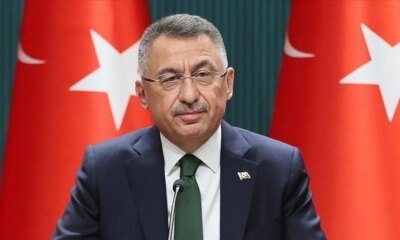
 Daily Agenda3 days ago
Daily Agenda3 days agoParliamentary Foreign Affairs Committee is going to the USA! Fuat Oktay: The constructive attitude of the congress is of critical importance in Türkiye-US relations
-
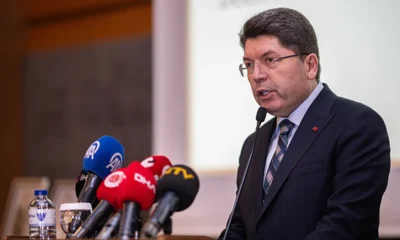
 Daily Agenda3 days ago
Daily Agenda3 days agoMinister of Justice Tunç: “The regulation regarding children involved in crime will come to the parliament after the commission works are completed.”
-
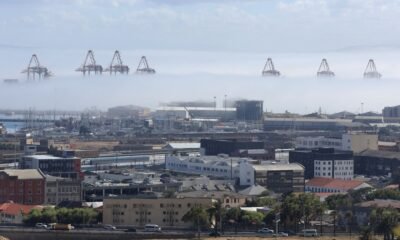
 Economy3 days ago
Economy3 days agoFacing US tariffs, South Africa steps toward trade deal with China
-
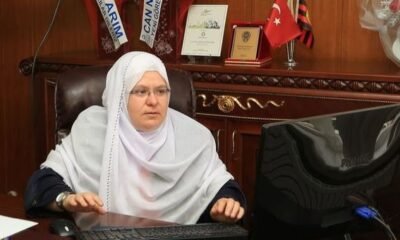
 Politics2 days ago
Politics2 days agoArrest, outrage after far-right man targets Turkish mayor’s dress
-
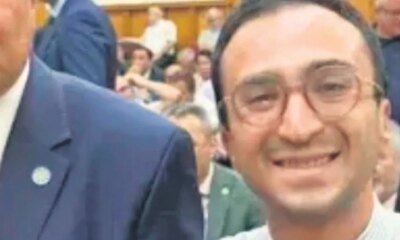
 Daily Agenda2 days ago
Daily Agenda2 days agoImmoral and excessive attack on women
-

 Sports3 days ago
Sports3 days agoTurkish center Alperen Şengün named in 2026 NBA All-Star
-
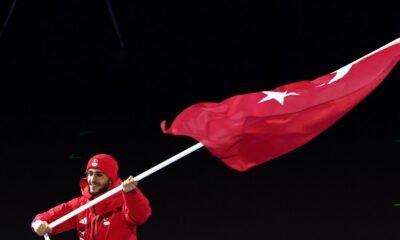
 Sports2 days ago
Sports2 days agoAkar carries Türkiye’s hopes into Olympic short track spotlight
-
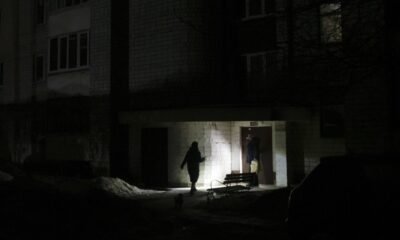
 Economy3 days ago
Economy3 days agoUkrainian businesses struggle to stay afloat amid ongoing power cuts



